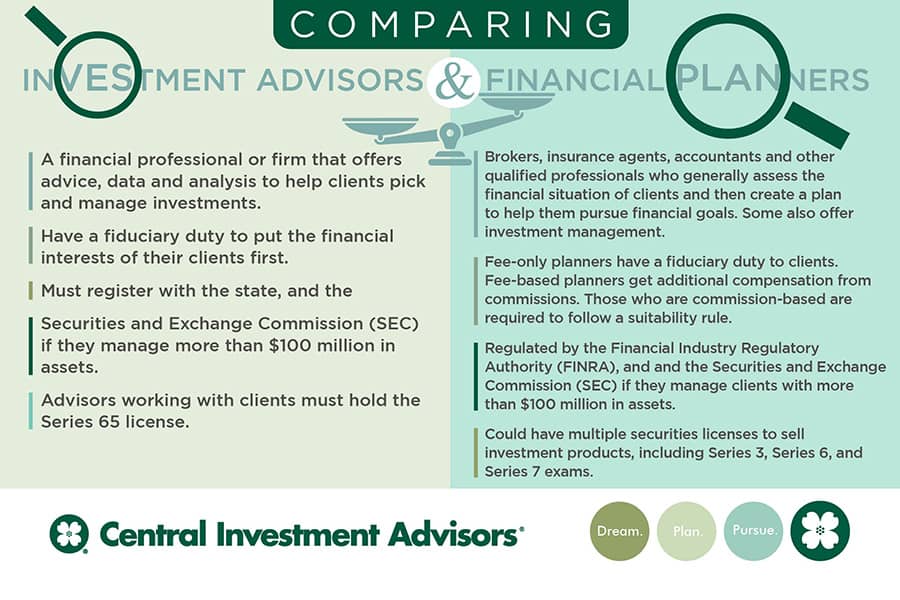
Learn about the difference between a financial planner and investment advisor. Use these tips on how to pick a financial advisor to help you.
Use this information to help you decide who can help guide you through the planning and investment process.
Need expert advice about your financial future?
A major life event like the birth of a child or one going off to school, a milestone birthday, or maybe just the dog days of summer could have you thinking of your financial future.
Should you be saving money, investing, or working on a plan to reach a particular goal like a college education, a cabin in the mountains, a condo at the beach – or maybe retiring early?
According to the National Institute on Retirement Security, more than 75 percent of Americans have not adequately planned for retirement, but it’s never too late to start. And with increasing costs for everything from fuel to groceries, spending wisely is more important than ever.
Financial planners and investment advisors can help guide you with professional training and experience. They know how to make the most of your finances and how to make them grow. But what exactly is the difference between the types of professionals, and what do you need to know to find someone who can help?
Often many of the terms related to financial planning and investing are interchanged, which can be confusing for consumers. Understanding the meaning of terms used and organizations referenced will assist with making decisions. Some commonly used terms include:
-
Fiduciary duty
— a planner or advisor with a fiduciary duty must act in a way that will first and foremost benefit their client’s interest. -
Asset allocation
— the way you divide your portfolio among asset classes—this is the first thing you should consider when getting ready to purchase investments. -
Risk tolerance
— an individual’s ability and willingness to stomach a decline in the value of your investments. -
Diversification
— the practice of spreading your investments around so that your exposure to any one type of asset is limited. This practice is designed to help reduce the volatility of your portfolio over time. -
Securities Exchange Commission (SEC)
— A U.S. government agency which oversees securities exchanges, securities brokers and dealers, investment advisors, and mutual funds in order to promote fair dealing, the disclosure of important market information, and to prevent fraud.
Financial Planner or Investment Advisor?
Financial planners typically help plan for retirement or other financial goals. They can introduce ways to budget, assist with insurance planning, estate planning and investment planning. Through a series of questions with a client, they will assess your situation and develop a plan which aligns your needs.
Individuals or companies that are investment advisors are legally regulated and registered through the Securities Exchange Commission (defined above) and/or the state in which they are located. They can take the planning a step further by focusing on investing in stocks, mutual funds or other securities; and building a portfolio that is tailored to you and your risk tolerance. Generally, they can go a little deeper in terms of investing.
Both financial planners and investment advisors should be licensed, many will have multiple licenses in areas of specialty. If either a planner or advisor is managing more than $100 million in assets, they must register with the SEC.
Individuals can confirm the licensure of a potential planner or advisor in a variety of ways. The Financial Industry Regulatory Authority’s BrokerCheck is one service which offers information on both SEC and state-registered investment advisors.

What’s the cost?
Most financial planners and investment advisors offer a free initial consultation. Think of it as a first date where you can ask questions and find out if you are compatible. After that first visit, the cost of services could be rendered in a variety of ways:
-
Fee-only structure
— will be more of a lump sum up front generally from $1,000 to $3,000. -
Fee-based structure
— will be an up-front fee and percent of commission earned from the sale of financial products like securities or insurance policies. The percent of commission could be anywhere from .20 percent and 2.0 percent.
Commission-based structure – advisor will be paid solely from the percent of financial products sold to clients.
Continuous management of your financial plan can also come with additional fees based on how often you wish to review and make changes. The financial planner or advisor should discuss all of this with you in your initial meeting.
How do you know if it’s a good fit?
Before your first date with your potential advisor, it’s helpful to think through some of your short-term and long-term goals and make a list of questions. They could include:
- What is the best strategy for earning money while still protecting my base?
An advisor will talk with you about your risk tolerance and the amount of time you have to build earnings. - How will you keep me updated on the progress toward my goals?
Be sure to discuss how often you want to meet or communicate for review of your plan, and what is best for you. - What is your approach to keeping my investments diversified?
Your advisor will talk about different types of investments with different risks and different percentage of returns and what will happen when the market fluctuates. - How do you approach your fiduciary duty?
An advisor should always work in the best interest of the client. - What are the tax implications related to financial investments?
Be sure you understand how you will pay taxes on earnings. If you are a person with a high income, there are special considerations. - What will my out-of-pocket costs be for your services? How will they be paid?
The advisor should explain all the fees involved including the percentage of commission you will pay of an investment purchase. - Can you give me an example of a successful investment plan you created and managed?
An experienced advisor should be able to point to successes and how they weathered times when the market was both up and down.
When is the right time to seek a professional?
You likely hire specialists and make time for services from medical professionals to licensed cosmetologists and electricians. Maybe you are wondering if you need a financial advisor or if you can do it yourself?
Generally, everyone can benefit from professional assistance when managing finances. The more complicated the situation becomes, the more important it is to have professional help and advice on specific topics and individual issues. No matter your stage in life, you want to be able to watch your money grow. Do-it-yourself can be great for backyard gardens and second-hand furniture, but when more is at stake, professional advice from our experts is money well spent.
Investing involves risk including the potential loss of principal. No investment strategy, including diversification, asset allocation and rebalancing, can guarantee a profit or protect against a loss.
This material is for informational purposes only. Neither LPL Financial, nor its registered representatives, offer tax or legal advice. Always consult a qualified tax advisor for information as to how taxes may affect your particular situation. Please note that individual situations can vary and therefore this information should only be relied upon when coordinated with individual professional advice.
Category: Wealth Planning
